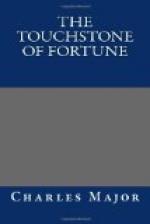“Ah, at last it is out!” he cried. “I have discovered your sin! I knew you must have one tucked about you somewhere. Wormwood wine! Absinthe! The drink of our depraved French friends! Who would have suspected you of using it?”
“Yes,” murmured Frances, glad to be found guilty of the wrong sin.
“Ah, well, we’ll have it together here at home,” said the king, “so that you need not go abroad for it hereafter.”
“No, no, I shall never again drink wormwood,” protested Frances. “Betty Pickering tells me it causes vapors in the head, horrid waking dreams, and in the end incurable spasms.”
“Your resolution is well taken,” returned the king. “We shall seek a harmless substitute.”
At this point in the conversation his Majesty looked toward me, whispered a word to Frances, and they walked down the garden path to the fountain, while I waited at Bowling Green for Frances’s return. When she came back, she told me in detail all that passed between her and the king.
After they had left me, the king began to talk, and Frances seldom interrupted him save to draw him out, knowing that a talking man sooner or later tells a great deal that he should have left unsaid. This is especially true if a shrewd listener reads between his words.
“Nelly Gwynn tells me that you love George Hamilton,” said the king, “and in my eyes, that is his greatest crime.”
Already his Majesty had told a great deal.
“I am surprised at Mistress Gwynn’s imagination and her lack of truthfulness,” returned Frances. “I told her I hated him, and she herself heard me deny that I knew him when he offered to speak to me two months ago or more at the Old Swan. Mistress Gwynn kissed him. I refused to recognize him. I should say that the evidences of affection were against her rather than me.”
“She says, also,” continued the king, “that you believe Master Hamilton killed Roger Wentworth; that you recognized him the night of the tragedy.”
“I said nothing of the sort,” answered Frances, emphatically. “I saw but one man’s face distinctly. Here at court I have often seen the man who killed Roger Wentworth, and I shall tell you his name if you insist. He is near of kin to your Majesty.”
The king knew that she meant his son Crofts, so he hastened away from the subject.
“Yes, yes, I have suspected as much, but I beg you, Frances, to spare me the pain of hearing the truth.”
“Yes, the truth is a frightful thing,” sighed Frances. “Why cannot the world be made up of pleasing lies? But tell me, does your Majesty mean to say that the wretch, Hamilton, seeks your life?”
She was seeking information.
“He does, he does,” returned the king. “While he was sick at the Old Swan, one standing outside his door heard him declare his intention to kill the king. When I heard of the threat, I summoned his physician, one Doctor Lilly, who, being questioned, admitted that while in a delirium Hamilton had made threats against the king’s life, but that he, Lilly, had supposed the French king was meant. Lilly is a good faithful subject, and I often use his astrological knowledge, which is really great, but in this case I suspect he is trying to shield Hamilton, believing, perhaps, that the threats meant nothing because they were made in delirium.”




